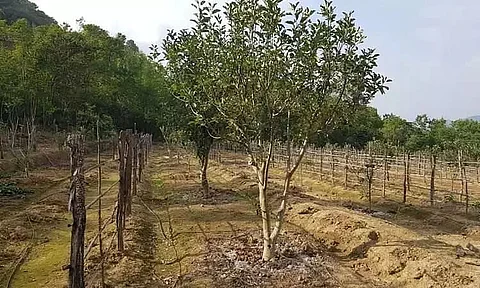
- Home
- Live Blog
- Breaking News
- Top Headlines
- Cities
- NE News
- Sentinel Media
- Sports
- Education
- Jobs

Since Awungshi Shimray Augustina harvested her first crop of sparkling, crisp apples from her orchard last week, Poi village in Manipur has been buzzing with stories about how spectacular the apples are.
"I planted 55 apple saplings that I got from Palampur in Himachal Pradesh in 2019. And in just two years, they have borne fruit," Augustina told Gaon Connection media house.
Augustina worked at a private corporation in the national capital before returning to her hometown of Ukhrul, Manipur, in 2016 to launch her agribusiness company.
A large number of farmers in Manipur and Mizoram, like Augustina, have resorted to apple cultivation kudos to the CSIR-Institute of Himalayan Bioresource Technology in Palampur.
Scientists at this institute have encouraged farmers in Manipur's Ukhrul district and Mizoram's Champhai district to cultivate "low chilling" apple varieties, and many farmers have created their own apple orchards, a first in the northeastern states.
In 2019, Augustina attended apple growing classes before planting 55 Himachal Pradesh apple seedlings on her land.
Rakesh Kumar, the senior scientist at the Institute of Himalayan Bioresource Technology, told Gaon Connection about this one-of-a-kind endeavour.
"In 2016, we had appraised the farmers in these states about the 'low chilling' variety of apples, and even supplied them with the saplings, right up till 2020," he said.
In Mizoram, the institution has also established apple demonstration plots in several locations.
There were half-hearted endeavors to plant apple trees in the North East in the 1990s, but they failed. However, this approach has gained traction in recent years, and many farmers who previously only grew rice, pineapple, and bananas have embraced it.
Low chilling apple types such as Anna, Dorset Golden, Sun Fuji, and others, according to Rakesh Kumar, do not need to undergo additional and very cold temperatures to flourish.
"Traditional varieties of apples require about a thousand to fifteen hundred hours of chilling, but the one we have introduced in the North East requires just about three hundred to five hundred hours of chilling," explained the scientist.
These kinds are most adapted to the temperate climates of Mizoram and Manipur, he added.
"There are at least ten thousand apple trees in Mizoram that were planted as a pilot project along with the state's district rural development agency" Rakesh Kumar said.
The CSIR provided technical assistance as well as seedlings for the study. And its personnel were on hand at all times to assist the farmers as they planted and nurtured the seedlings.
While conducting the course, the scientists encountered a number of difficulties, notably in Champhai, Mizoram, and Ukhrul, Manipur, which border Myanmar to the east.
"Most of the farmers spoke no English nor Hindi and communication was a struggle," Rakesh Kumar said.
They managed, however, with the assistance of the district horticulture department and the district rural development agency.
"We started the apple trials in 2016 and we are happy with the results," K Zonunsanga, Champhai's assistant district horticulture officer, told Gaon Connection. "More than a hundred farmers are now cultivating apples here and soon we won't have to import the fruit from other states," he said.
"There is a great future for apple cultivation in the North East," said Rakesh Kumar.
People in the neighbourhood may love the apples, and there is a big advantage to reducing the carbon footprint of importing apples from afar, he added.
Meanwhile, Augustina remains an apple ambassador in Poi, Manipur.
"I am asked all the time about apple cultivation and I know there are many farmers here who are already preparing their ground to receive apple saplings," she said.
According to Sanjay Kumar, the institute's director, the CSIR-Institute of Himalayan Bioresource Technology first signed a Memorandum of Understanding (MoU) with the North Eastern Region Community Resource Management Project (NERCORMP) in 2016.
"Under this, the farmers in the northeast had to be informed about apple farming. The initiative was first launched in Mizoram and now the farmers in Manipur are practicing apple culitvation as well. The yields have been promising," he said.